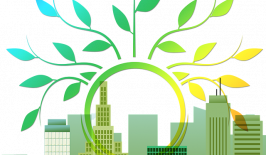Did you know toilet paper can be used more than once? In Holland, a new technology that recycles loo roll is being used to create material for bike lanes.
It’s one of the most ubiquitous consumer products around. In Holland alone, it is estimated that some 180,000 tons of toilet paper are used every year. Toilet paper enters the sewage system and needs to be treated before it is disposed of. Together with the rest of the sludge, it is normally dried and then incinerated, with all of the associated environmental and economic costs, such as CO2 emissions and the burning of valuable resources.
But now a new technology that can extract high quality cellulose from used toilet paper, and convert it into commercial products, means that we are able to recoup valuable resources from what might generally be considered one of the most unappealing materials around.
Taking Toilet Paper From Bathroom to Bitumen
A new cellulose-harvesting system, the Salsnes Filter, separates cellulose fibres from the toilet paper that has entered the waste water system, cleans and disinfects them before they can be sold on and be turned into a variety of commercial products.
Indeed, the cellulose recouped through this technology can be used a replacement for bitumen in asphalt, turned into bio-plastics, or into bio-composites for building materials.
In the Netherlands, in the first pilot of this kind, CirTec – in partnerhips with consultants KNN – has been using the Salsnes Filter technology to convert used toilet paper into materials to build cycle lanes, with the the first recycled-toilet-paper cycle-lane now stretching for one km between Leeuwarden and Stiens, in the north of the country.
Apparently, thanks to its permeability, adding cellulose from the toilet paper to conventional asphalt helps maintain traction on slippery roads. According to an expert, interviewed by CityLab:
“When roads get wet, they get slippery, so we use this asphalt because it takes water away from the road surface quicker”
The technology has clearly got huge potential not just in a country renowned for its love of cycling and its bike infrastructure, but also within manufacturing and construction industry more generally. It is yet another step towards highlighting the hidden value of waste materials, towards weaning us off the use of unnecessary virgin resources, and the environmental and economic costs associated with their extraction and use.
Indeed, a number of other waste water treatment plants in the UK, Spain, Italy, Greece and Israel are also conducting pilots in this new technology. So watch this space, for a recycled-toilet-paper cycle-lane could be coming to you in the near future.
Here is Carlijn Lahaye, Managing Director of CirTec, speaking to the BBC about the project:









